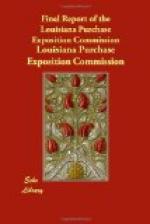origin, who were associated with them, were still
clinging close to the eastern seaboard, the pioneers
of Spain and of France had penetrated deep into
the hitherto unknown wildness of the West and
had wandered far and wide within the boundaries
of what is now our mighty country. The very
cities themselves—St. Louis, New Orleans,
Santa Fe, N. Mex.—bear witness by their
titles to the nationalities of their founders.
It was not until the Revolution had begun that the
English-speaking settlers pushed west across the
Alleghanies, and not until a century ago that
they entered in to possess the land upon which
we now stand.
We have met here to-day to commemorate the hundredth anniversary of the event which more than any other, after the foundation of the Government, and always excepting its preservation, determined the character of our national life—determined that we should be a great expanding nation instead of relatively a small and stationary one.
Of course, it was not with the Louisiana Purchase that our career of expansion began. In the middle of the Revolutionary war the Illinois region, including the present States of Illinois and Indiana, was added to our domain by force of arms, as a sequel to the adventurous expedition of George Rogers Clark and his frontier riflemen.
Later the treaties of Jay and Pinckney materially extended our real boundaries to the west. But none of these events was of so striking a character as to fix the popular imagination. The old thirteen colonies had always claimed that their rights stretched westward to the Mississippi, and vague and unreal though these claims were until made good by conquest, settlement, and diplomacy, they still served to give the impression that the earliest westward movements of our people were little more than the filling in of already existing national boundaries.
But there could be no illusion about the acquisition of the vast territory beyond the Mississippi, stretching westward to the Pacific, which in that day was known as Louisiana. This immense region was admittedly the territory of a foreign power, of a European kingdom. None of our people had ever laid claim to a foot of it. Its acquisition could in no sense be treated as rounding out any existing claims. When we acquired it, we made evident once for all that consciously and of set purpose we had embarked on a career of expansion; that we had taken our place among those daring and hardy nations who risk much with the hope and desire of winning high position among the great powers of the earth. As is so often the case in nature the law of development of a living organism showed itself in its actual workings to be wiser than the wisdom of the wisest.
This work of expansion was by far the greatest work of our people during the years that intervened between the adoption of the Constitution and the outbreak of the civil war. There were




